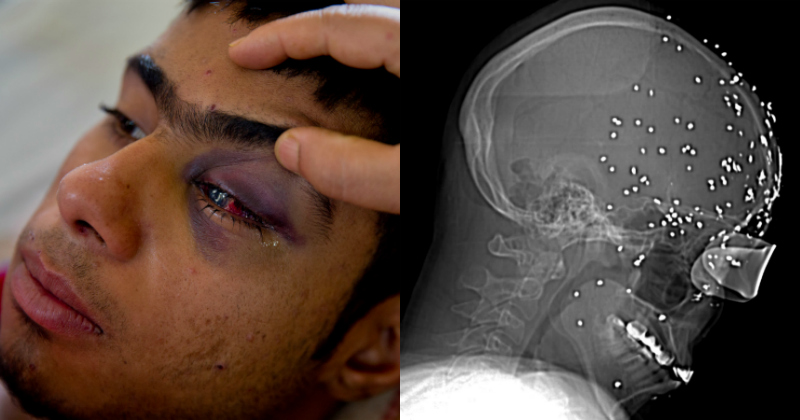
The vast majority of people who suffered eye injuries as a result of rifle pellets in Srinagar between July and November of 2016 have lost a degree of vision, Times of India reported.
Quoting a research paper, the report added that, on 777 eye procedures performed during this time period, over 80% of them have been limited to “counting fingers.”
The researchers strongly cautioned against using pellet guns on civilians. It stated that the injuries put a “major physical, emotional, and socioeconomic burden” on society and the patients (mainly males aged 20 to 29) due to poor vision, high medical care costs, and long-term rehabilitation.
One of the main authors of the paper, published in ‘The Indian Journal of Ophthalmology’, is Mumbai-based retina surgeon Dr S Natrajan. He had traveled to Srinagar five times in 2016 to operate on those injured by pellets, along with a doctor each from New Delhi and Chennai. Their visits came in the aftermath of the standoff between protestors, who were throwing stones, and the security forces who retaliated by shooting pellets.
Incidentally, most of the patients (98.7%) received surgical intervention on the day of admission or the very next day.
The medical response was also “unique” in that the three surgeons managed more than 777 patients, conducted over 550 primary eye repairs, and performed over 370 vitreoretinal surgeries.
“In comparison, 797 cases of severe eye injuries were reported in the war in Iraq from 2003 to 2005, of which 116 eyes were removed. Report from the British armed forces in Iraq and Afghanistan showed a total of 63 cases of ocular injury from 2004 to 2008,” said the article.
According to Amnesty Iternational, in the seven months following Burhan Wani’s killing in July 2016, over 6,000 people were injured by pellet guns, including 782 who suffered injuries in their eyes.
The APDP, a Kashmir based rights group said it collected and recorded about 300 testimonies of pellet gun victims injured during the 2016 protests. “Over 80 civilians were killed and 352 civilians were partially or completely blinded,” APDP reported.
Following the spate of injuries in 2016 the Indian government said they would issue “deflectors”— attachments to stop pellets traveling upwards into people’s eyes.




